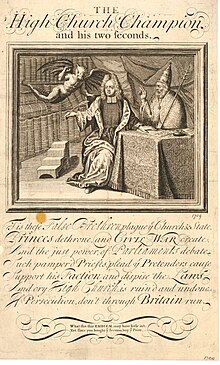High church
The high church are the beliefs and practices of Christian ecclesiology, liturgy, and theology that emphasize "ritual, priestly authority, [and] sacraments".There remain parishes that are high church and yet adhere closely to the quintessentially Anglican usages and liturgical practices of the Book of Common Prayer.To a lesser extent, looking back from the 19th century, the term high church also came to be associated with the beliefs of the Caroline divines and with the pietistic emphases of the period, practised by the Little Gidding community, such as fasting and lengthy preparations before receiving the Eucharist.The continued use of the King James version of the Bible, by Anglicans and other Protestants alike in the English-speaking world, is a reflection of the success of this endeavour at cooperation.The subsequent split over office-holders' oaths of allegiance to the Crown and the Royal Succession, which led to the exclusion of the Non-Juror bishops who refused to recognise the 1688 de facto abdication of the King, and the accession of King William III and Queen Mary II, and did much to damage the unity of High Church party.Thomas Hancorne, a Welsh clergyman prominent in jacobite circles, gave the County of Swansea's assize sermon on 18 April 1710 (The right way to honour and happiness), during which he complained of the "rapid growth of deist, freethinking and anti-trinitarian views.This led to an increasing marginalisation of High Church and Tory viewpoints, as much of the 18th century was given over to the rule of the Whig party and the aristocratic families who were in large measure pragmatic latitudinarians in churchmanship.

AnglicanismTheologyChristian theologyAnglican doctrineThirty-nine ArticlesBooks of HomiliesCaroline DivinesChicago–Lambeth QuadrilateralEpiscopal politySacramentsMinistryEucharistKing James VersionBook of Common PrayerLiturgical yearChurchmanshipCentralMonasticismSaintsJesus PrayerChristianityChristChristian ChurchFirst seven ecumenical councilsCeltic ChristianityAugustine of CanterburyMedieval cathedral architectureApostolic successionHenry VIIIEnglish ReformationThomas CranmerDissolution of the monasteriesChurch of EnglandEdward VIElizabeth IMatthew ParkerRichard HookerJames ICharles IWilliam LaudNonjuring schismLatitudinarianAnglo-CatholicismLiberalOxford MovementAnglican CommunionAnglican Communion historyArchbishop of CanterburyAnglican Communion Primates'MeetingsLambeth ConferenceBishopsAnglican Consultative CouncilEcumenismOrdination of womenWindsor ReportContinuing Anglican movementAnglican realignmentBartonville AgreementCongress of St. LouisNorth American Anglican ConferenceecclesiologyliturgyChristian traditionsAnglicanritual practicesRoman CatholicismEastern Orthodoxylow churchevangelicalAnglo-CatholicLutheranPresbyterianMethodistCentre ChurchRoman CatholicEastern OrthodoxaltarpiecesvestmentsanathemaabortionPresbyterianismMethodismLutheranismhigh churchNeo-LutheranismPietismbroadsideHenry SacheverellPoperyback-formationtolerationPuritansliturgicalepiscopalLatitudinariansJohn Henry NewmanEdward Bouverie PuseyLittle Gidding communityfastingToryismAgrarianismClassicismCounterrevolutionHigh cultureInterventionismLoyalismMonarchismNoblesse obligeTraditionalismTraditionalist CatholicismRoyalismUnionismCavaliersCavalier ParliamentChâteau CliqueConservative corporatismDivine right of kingsFamily CompactJacobitismPowellismRobert Filmer1st Earl of ClarendonRoger L'Estrange1st Earl of Rochester1st Viscount Bolingbroke